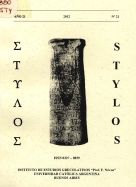Please use this identifier to cite or link to this item:
https://repositorio.uca.edu.ar/handle/123456789/4930| Título: | Ἄναξ y Βασιλεύς : Sociedad, dioses y Dios : Homero y literatura cristiana : Gregorio Nacianceno | Autor: | Obligado, Rebeca | Palabras clave: | LITERATURA GRIEGA; ANALISIS LITERARIO; FILOLOFIA; Homero; POESIA GRIEGA; SOCIEDAD; RELIGION; LITERATURA CRISTIANA; Gregorio Nacianceno, Santo, ca.329-390 | Fecha de publicación: | 2012 | Editorial: | Universidad Católica Argentina. Facultad de Filosofía y Letras. Instituto de estudios grecolatinos "Prof. F. Nóvoa" | Cita: | Obligado, Rebeca. “Ἄναξ y Βασιλεύς : sociedad, dioses y Dios : Homero y literatura cristiana: Gregorio Nacianceno” [en línea]. Stylos, 21 (2012). Disponible en: https://repositorio.uca.edu.ar/handle/123456789/4930 | Resumen: | Resumen: el sustrato social que supone la Ilíada, menos la Odisea, y el panteón homérico, justifican el uso del término de origen micénico ἄναξ por encima del griego βασιλεύς. De allí la abundancia del primer lexema en el s.VIII a.C. Pero ἄναξ tiene escasísimas ocurrencias en los dos siglos siguientes hasta que los trágicos del s.V lo retoman en obras de temática homérica. La literatura pagana lo vuelve a olvidar, hasta que finalmente hace eclosión en el siglo IV, en Gregorio de Nazianzo. Se intentará mostrar cómo sociedad y religión, en los Capadocios como antes en Homero, son la clave para entender la resemantización del antiguo epíteto micénico. Abstract: The social substratum in Ilias and Odyssea and the Homeric pantheon can justify the use of Mycenic’s word ἄναξ more than the greek word βασιλεύς. Hence its importance in the 8th. century B.C. But ἄναξ has very few presence in the next two centuries until the tragic authors of the 5th century use it in their Homeric subject plays. It will be once again left aside by the pagan literature, till, at the 2nd century A.D., is reintroduced by authors like Clemens Alexandrinus, and finally emerges at the 4th Century, specially between the Cappadocian Fathers. It will be shown how society and religion, as appeared in the Cappadocians and later in Homer, are the key to understanding the ancient mycenic epithet’s new meaning. |
URI: | https://repositorio.uca.edu.ar/handle/123456789/4930 | ISSN: | 0327-8859 | Disciplina: | LITERATURA | Derechos: | Acceso Abierto | Fuente: | Stylos, nº 21, 2012 |
| Appears in Collections: | STY - 2012 nro. 21 |
Files in This Item:
| File | Description | Size | Format | |
|---|---|---|---|---|
| sociedad-dioses-dios-homero-literatura.pdf | 210,74 kB | Adobe PDF |  View/Open |
Page view(s)
169
checked on Apr 27, 2024
Download(s)
172
checked on Apr 27, 2024
Google ScholarTM
Check
This item is licensed under a Creative Commons License

